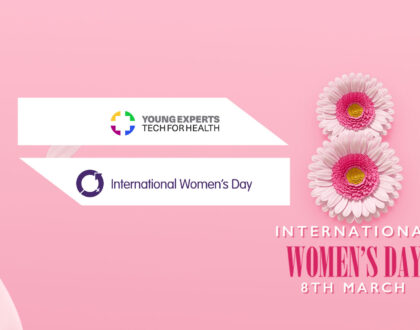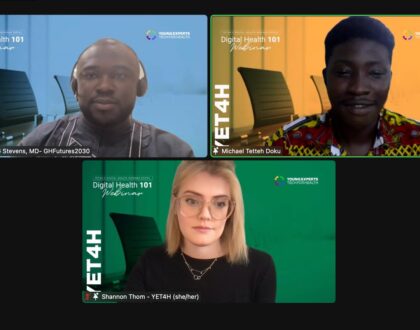Young People Demand Greater Investments In Themselves: Transform Health At AHAIC 2021

While organisations across the globe, particularly in the global health and development sectors, are waking up to calls for a more meaningful engagement of young people, young people across Africa report feeling consistently excluded from decision-making processes that affect their health and their lives. This exclusion takes place on several fronts – from not having the access required to engage with policy making processes in the first place, to engagement efforts appearing hollow and tokenistic. Listening to young people makes it clear that decision makers need to interrogate whether their commitment towards youth engagement is genuine or merely a compliance exercise.
“We must invest in young people and youth-led organisations beyond one-off conferences,” said Dr Natasha Salifyanji Kaoma, the CEO of Copper Rose Zambia, a youth-led organisation that works with young people in Zambia on their sexual and reproductive health and rights (SRHR). “Too many organisations will fly young people around the world, but not invest in their skills and their work.”
This lack of investment in the capacity building of young people was criticized by several young people, whose voices took centre stage at the plenary session on Youth Leadership in Global Health at the Africa Health Agenda International Conference 2021 (AHAIC 2021), held on 10th March by Transform Health, Fondation Botnar and Y-ACT. Along with Dr. Kaoma, three other young leaders shared the stage with Richard Dzikunu, the facilitator, representing the Young Experts: Tech 4 Health group.
Dr. Shakira Choonara, the Youth Ambassador for the African Union, also called out empty tokenistic practices that are pushed forth under the guise of meaningful youth engagement – “Why are you inviting young people? If it’s just for a conference, it’s a checkbox exercise – to the extent that they even script what you’re going to say, how you’re going to say it, what question you will be asked. That’s not inclusion.” She underscored the need for long-term and sustained investment into building the capacity of young people. “If you are a global health organisation thinking about how to build a cohort of young people, consider investing for 5-10 years to professionalise youth and build their capacities.” She cited the example of how interns at the WHO have only just begun to be provided with living expenses. Richard Dzikunu, the session facilitator, echoed this sentiment. “Young people are engaged in public-facing activities by organisations, but their capacity is not built such that they can sustain themselves professionally.”
The perception that young people are not deserving of a place at the table, that their time will come, is at odds with the reality on the continent. While it is true that young people are the future of African, leaders can no longer ignore the fact that the majority of the continent’s population is under 25. Young people are here now, shaping the digital transformation of health systems and opening new opportunities for progressing towards universal health coverage by 2030.
“There is no government in the world that is comfortable and eager to have young people participate. It is not comfortable or convenient. If we wait to be engaged and for them to invest in us, it will be tokenistic.” Hon. Johnson Sakaja, the dynamic young Senator of the Nairobi City County, made powerful statements about young people being a “force to be reckoned with”. He insisted that the way to meaningful youth engagement lay in young people organising, getting out on the streets, and ensuring that more young people were elected into positions of power. “If you’re better organized, then you become better recognized. They will no longer be able to ignore you.”
Tito Ovia, the co-founder of digital health start-up Helium Health whose health tech solutions are being used by over 5,000 doctors across West Africa, agreed with Senator Sakaja’s sentiment. She too believed that progress lay in young people seizing opportunities and letting their work speak for themselves. On speaking of her journey of transforming and digitizing healthcare in West Africa, she said that it soon became imperative that they had to engage with the public sector and governments in order to truly make a meaningful difference. “The only reason we were able to scale and grow, was the quality of our work and the personal touch we provided. We as young co-founders, were dedicated to every aspect of our business. Nobody can now doubt our capacity as a company. Let your work speak for itself and do your research to make sure you know what you’re asking for.”
The emphasis on young people investing in their own capacities was stressed by most of the speakers. Dr. Kaoma said, “We need to be knowledgeable. When we get to that meeting, we need to contribute and hold our ground.” Similarly, Dr. Choonara encouraged young people to demand better of organisers, and not feel pressured into agreeing to terms they are not happy with. “Ask yourself, why are they inviting me? You have the right to say no if it doesn’t align with your passions. Follow up with post-conference activities to reiterate your commitment to the plan of action.” Youth responsibility is an equally important part of meaningful youth engagement.
This kind of investment in personal skill building and capacity strengthening is shaped, in a large way, through the existence of peer networks and mentorship among young people. Across the continent, young people are already driving innovations in digital health. We require more opportunities to allow the next generation of entrepreneurs to develop digital health solutions that respond to the needs of young people. “I have achieved a lot more in my short career as a global youth activist than many others, and that has been because of mentorship from other young leaders.” said Dr. Kaoma. Richard Dzikunu, resonated with this sentiment. “We are all a product of investment by various organisations.”
However, we must remember that young people are not a monolith. It is often young people with the most access to economic and social power structures that find seats at the table, while the voices and needs of marginalized youth are not considered at decision making spaces. The knowledge and experiences of diverse African youth must be leveraged if we are going to accelerate progress towards UHC in a digital, post-COVID world. This means supporting more young people from underrepresented groups to develop their leadership skills.
At a very fundamental level, youth need access to these spaces and opportunities to build peer networks and find mentors. We need investments in digital infrastructure, electricity and subsidized mobile data to improve digital penetration to ensure it is not only young people with access that are on the receiving ends of opportunities. Similarly, leaders need to invest in building supportive and youth-friendly work cultures and in the professionalization of young people.
In order to satisfy the healthcare needs and right to participation of the continent’s growing young population, African governments, working with the private sector, international organisations and civil society need to harness digital technology and data. The equitable and responsible use of digital technologies can transform health systems and create new ways for young people from different backgrounds to be part of decision-making processes. Greater commitment and investments in young people’s engagement, capacity building and advocacy are essential to harness the potential of more African youth to drive equitable progress towards development goals.
Recommended Posts

YET4H marks International Women’s day
March 29, 2023


